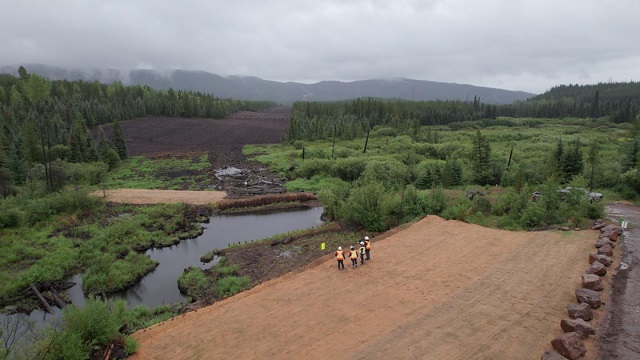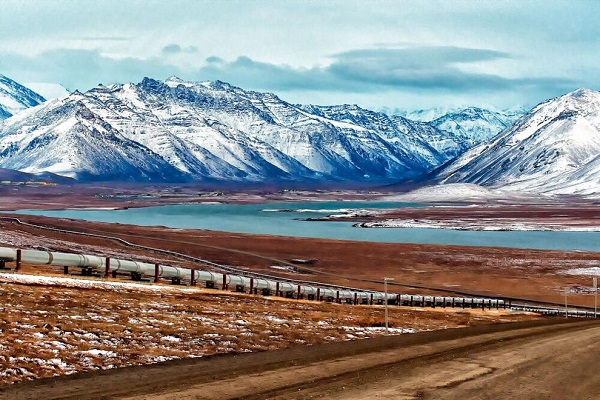Energy
Coastal GasLink pipeline construction into the home stretch

As construction on Coastal GasLink winds down, crews are working to cleanup and reclaim the land. Clay and topsoil removed during construction has been stored on site and will now be used to contour the land to its previous shape to re-establish original drainage patterns. Photo courtesy Coastal GasLink
From the Canadian Energy Centre
By Deborah Jaremko98% of pipe installed, all water crossings complete
“Incredible progress” continues on the Coastal GasLink pipeline, with 98 per cent of pipe now installed.
The project has also achieved a major milestone with completion of all 800 water crossings along the route from northeast B.C. to the LNG Canada terminal being built in Kitimat.
This includes 10 major “trenchless” water crossings, the project reported in its latest construction update.
Where a “trenched” watercourse crossing involves digging a trench through a flowing watercourse, trenchless crossings use horizontal drilling so there is little to no disturbance to the riverbed or banks, according to the Canada Energy Regulator.
Coastal GasLink has used a trenchless micro-tunneling approach in areas such as crossing the Wedzin Kwa (Morice River) near Houston, B.C.
As the First Nations LNG Alliance described, this creates a tunnel beneath the riverbed using a remote-controlled tunnel boring machine. Then hydraulic jacks push concrete casing segments through the tunnel.
Coastal GasLink completed the Morice River crossing in July.
In August, the fifth of eight pipeline segments was completed by Nadleh-Macro, a partnership between the Nadlah Whut’en First Nation and Macro Pipelines.
In all, Coastal GasLink said it has awarded $1.7 billion in contracts to local and Indigenous businesses so far.
There are about 4,800 people still working along the project route. Crews are ensuring the ground and topsoil is reinstated to be ready to start reclamation, and reclamation is underway in many sections along the route, the project said.
“Until the route is completely revegetated, which could take a few years due to seasonal constraints, our crews will continue implementing and monitoring measures as required to protect the environment and meet our commitments,” Coastal GasLink said.
Completion is expected by the end of the year. Meanwhile, at last report construction of the LNG Canada terminal is about 85 per cent complete and on track to shipping first cargos of B.C. LNG to global markets by 2025.
Energy
Houses passes bill to protect domestic oil production, protect Iñupiat community

From T
Indigenous communities are advocating for economic development projects in the North Slope, explaining that more than 95% of their tax base comes from resource development infrastructure.
The U.S. House passed another a bill to advance domestic energy production, this time in response to cries for help from an indigenous community living in the Alaska North Slope.
The bill’s cosponsor, a Democrat from Alaska, did not vote for her own bill. It passed with the support of five Democrats, including two from Texas who are strong supporters of the U.S. oil and natural gas industry.
The U.S. House has advanced several bills and resolutions to support domestic U.S. oil and natural gas production, supported by Texas Democrats. They’ve done so after the Biden administration has taken more than 200 actions against the industry, The Center Square reported.
One includes the Department of the Interior restricting development on over 50% of the Arctic National Wildlife Refuge (ANWR), directly impacting the Iñupiat North Slope community.
The Alaska North Slope region includes a part of ANWR and National Petroleum Reserve-Alaska (NPRA). Both are home to the indigenous Iñupiat community who maintain that the Biden administration is trying to “silence indigenous voices in the Arctic.”
The plan to halt North Slope production was done through a federal agency rule change, a tactic the administration has used to change federal law bypassing Congress. The rule cancels seven oil and gas leases issued by the Trump administration in the name of “climate change.” Interior Secretary Deb Haaland said canceling the leases was “based on the best available science and in recognition of the Indigenous Knowledge of the original stewards of this area, to safeguard our public lands for future generations.”
The indigenous community strongly disagrees, saying they weren’t consulted before, during or after the rule change.
Nagruk Harcharek, president of the Voice of Arctic Iñupiat, a nonprofit that represents a collective elected Iñupiaq leadership, says the administration’s mandate “to ‘protect’ 13 million acres of our ancestral homelands was made without fulfilling legal consultative obligations to our regional tribal governments, without engaging our communities about the decision’s impact, and with an incomplete economic analysis that undercuts North Slope communities.”
He argues the administration has overlooked “the legitimate concerns of elected Indigenous leaders from Alaska’s North Slope. This is a continuation of the onslaught of being blindsided by the federal government about unilateral decisions affecting our homelands.”
Restricting NPR-A oil production is “yet another blow to our right to self-determination in our ancestral homelands, which we have stewarded for over 10,000 years. Not a single organization or elected leader on the North Slope, which fully encompasses the NPR-A, supports this proposed rule,” he said, adding that they asked for it to be rescinded.
In response, U.S. Reps. Mary Sattler Peltola, D-Alaska, and Pete Stauber, R-Minn., introduced HR 6285, “Alaska’s Right to Produce Act.” The U.S. House Committee on Natural Resources Subcommittee on Energy and Natural Resources held a hearing on the issue; members of the Iñupiat Community of the Arctic Slope and the Kaktovik Iñupiat Corporation testified.
Kaktovik Iñupiat Corporation president Charles Lampe said they “refuse to become conservation refugees on our own homelands and unapologetically stand behind the Alaska’s Right to Produce Act.”
The Kaktovik is the only community located in the ANWR. The North Slope Iñupiat have stewarded their ancestral homelands for thousands of years, predating the creation of the U.S. federal government, the Interior Department and the state of Alaska, they argue.
The indigenous communities are advocating for economic development projects in the North Slope, explaining that more than 95% of their tax base comes from resource development infrastructure. Tax revenue funds public school education, health clinics, water and sewage systems, wildlife management and research and other services that otherwise would not exist, they argue. Eliminating their tax base, will directly impact their lives and jeopardize their long-term economic security, they argue.
The House passed Alaska’s Right to Produce Act on Wednesday to reverse the rule change and establish the Coastal Plain oil and gas leasing program. It authorizes and directs federal agencies to administer oil and natural gas leasing on 13 million acres of public land in the North Slope.
The bill passed by a vote of 214-199 without the support of its Democratic cosponsor from Alaska, Peltola, who voted “present.”
Five Democrats voted for it: Sanford D. Bishop, Jr. of Georgia, Henry Cuellar and Vincente Gonzalez of Texas, Jared Golden of Maine and Marie Gluesenkamp Perez of Washington. One Republican voted against it, Rep. Brian Fitzpatrick of Pennsylvania.
After it passed, Harcharek said, “Since the Biden administration announced this decision in September, our voices, which overwhelmingly reject the federal government’s decisions, have been consistently drowned out and ignored. This administration has not followed its well-documented promises to work with Indigenous people when crafting policies affecting their lands and people. We are grateful to Congress for exercising its legislative authority to correct the federal government’s hypocrisy and advance Iñupiaq self-determination in our ancestral homelands.”
Kaktovik Mayor Nathan Gordon, Jr. said the administration “is regulating our homelands in a region they do not understand and without listening to the people who live here.” The new law is “a vital corrective measure that will prevent our community from being isolated and protect our Iñupiaq culture in the long term.”
The bill heads to the Democratic controlled Senate, where it is unlikely to pass.
Alberta
Official statement from Premier Danielle Smith and Energy Minister Brian Jean on the start-up of the Trans Mountain Pipeline

-

 Alberta2 days ago
Alberta2 days agoOfficial statement from Premier Danielle Smith and Energy Minister Brian Jean on the start-up of the Trans Mountain Pipeline
-

 Economy2 days ago
Economy2 days agoToday’s federal government—massive spending growth and epic betting
-

 Economy2 days ago
Economy2 days agoYoung Canadians are putting off having a family due to rising cost of living, survey finds
-

 COVID-191 day ago
COVID-191 day agoCanada’s COVID vaccine injury program has paid out just 6% of claims so far
-

 Environment1 day ago
Environment1 day agoClimate Alarmists Want To Fight The Sun. What Could Possibly Go Wrong?
-

 Opinion7 hours ago
Opinion7 hours agoClimate Murder? Media Picks Up Novel Legal Theory Suggesting Big Oil Is Homicidal
-

 International2 days ago
International2 days agoNYPD storms protest-occupied Columbia building, several arrested
-

 Addictions16 hours ago
Addictions16 hours agoCity of Toronto asks Trudeau gov’t to decriminalize hard drugs despite policy’s failure in BC








